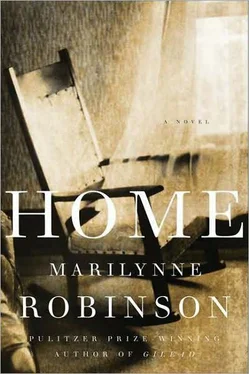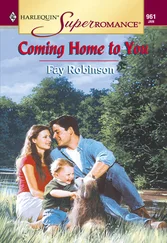JACK STILL HAD A LETTER TO MAIL ALMOST EVERY DAY. HE TOOK the letters to the post office, at the back of the drugstore. He dressed carefully before every venture into town, jacket, tie, and hat. It was a louche sort of respectability he achieved, she thought, but it was earnestly persisted in, with much attention to the shine on his shoes. He would sometimes tell her whom he had met on the street, if he recognized anyone, or, more precisely, if anyone recognized him. He reported brief conversations as if they were heartening, proof of something. Once he said, “I believe I could see myself here. Jack Boughton, honest working man. Little wife at home, little child — frolicking with his dog, I suppose. Not unthinkable.” And sometimes he came back drawn and silent, as if he had been shunned or slighted, perhaps. All those letters, and never a word about whomever it was he sent them to, and never a word of reply.
One day when she was in the parlor, dusting among the clutter of gifts and souvenirs that crowded the mantel, he said, “Well, Glory, I did as I was told. I stopped by Ames’s, paid my respects. Met the wife.” He laughed. “You know, after all these years he still can’t stand the sight of me.”
She said, “He’s a kind old fellow. He was probably just tired, probably up all night.”
“No doubt you’re right.” Then he said, “I’m an insensitive brute for the most part. But if there is one thing I know I can recognize, it is dislike. If he allows himself such thoughts, he was sitting there on his front porch thinking, Here comes Jack Boughton, that son of a bitch.”
“Maybe. Maybe not.”
“Sorry.”
“For what?”
“The language.”
“Never mind.”
He shook his head. “It’s hard, coming back here.” He opened the piano and touched middle C. “Did somebody tune this?”
“Papa had it tuned when I told him I was coming home. Back. That was the first thing he wrote to me, after his regrets and prayers and so on. ‘It will be wonderful to have music in this house again.’ I haven’t played, though. I haven’t really felt like it.”
Jack slid onto the bench. “I can’t do it without squinting one eye,” he said. He took a sip from an imaginary glass, set it down again, and sang, “‘When your heart’s on fire, you must realize, smoke gets in your eyes.’”
“I hate that song,” she said.
“‘I’ll be seeing you, in all the old familiar places. .’”
“Stop it,” she said.
He laughed. “Sorry. I really am sorry.” He shrugged. “Limited repertoire.”
“How can you even have a repertoire? You never practiced!”
“I thought playing piano had something to do with being Presbyterian. Nobody told me you could get paid for it.”
Their father’s voice rose from the next room, reedy and perfectly pitched. “‘This robe of flesh I’ll drop and rise, To seize the everlasting prize. .’”
Jack said, “I guess that’s a hint,” and he played the hymn through, embellishing a little but respectfully enough. “‘And sing while passing through the air, farewell, farewell, sweet hour of prayer.’” He knew the words, and he whispered them as he played. Well, that always was their father’s favorite hymn.
“Yes!” the old man said. “And I would also very much enjoy ‘Shall We Gather at the River.’ Or ‘The Church’s One Foundation,’ if you prefer that one. It’s all the same to me.” And he began, rather lustily, “‘Shall we gather at the river, the beautiful, beautiful river—’” Jack plunged in after him. “That was rousing, Jack! Yes, the old songs. I believe I’ve worked up an appetite. Four o’clock. Well, I might have a cookie—”
Jack said, “I’ll get one for you. Milk?”
“If you don’t mind.”
Jack brought him a plate and a glass. “Here you are, sir.”
His father said, “It’s always ‘sir,’ isn’t it? Never Papa. Or Dad. Some of the others call me Dad now, some of the boys do.”
“It’s a habit, I suppose. Do you mind?”
“Oh no, Jack, I don’t mind! Call me whatever you like! It’s just so good to hear your voice. To hear your voice in this house again. It’s just wonderful. If I could tell your mother, she’d never believe me.” He took Jack’s hand and stroked it.
Jack said, “Thank you, sir. It’s good to be here.”
And his father said, “Oh yes. Well, I hope so. That’s another matter entirely, isn’t it. Yes, it is.” He patted Jack’s hand and released it. “There’s not much I can do about it. That’s how it is.” He said, “I know Glory got her feelings hurt something terrible. Terrible.” He shook his head.
Jack looked at her, almost as if he had just learned something about her that was not perfectly obvious. Or maybe it was to see her reaction, to confirm his sense of things. How should she react? Her father understood much more than his happiness could abide with, and he was very old.
“I’ll start supper,” she said.
THE NEXT MORNING JACK WAS OUT IN THE GARDEN EARLY, cutting back weeds and spading up the soil. The old prairie came back the minute a spot of ground fell into neglect. Suddenly there would be weeds head high, gaunt shafts of plants with masses of tiny flowers on them, dusty lavender, droning with bees. And there would be black-eyed Susan, and nettles and milkweed and jewelweed and brambles and some avid vine that wilted in sunlight and broke at the slightest touch, leaving tiny whiskers of thorn in the hand that touched it. The roots they put down were deep and tough. It was miserable work to get them up. And here was Jack outside in the new morning light wrestling weeds out of the ground for all the world as if something depended on it. Glory made a pot of coffee and carried a cup of it out to him.
“I am working up an appetite,” he said. “Today I will eat. Tonight I will sleep.” He stood the spade in the ground and sipped the coffee. “Excellent. Thank you.” They saw the little Ames boy in the road, walking along with his friend Tobias, the two of them elaborating a tale or a joke of some sort, to judge by the laughter. Robby saw them and shouted, “Hey, Mr. Boughton!”
Jack said, “I guess that’s me.” He handed her the cup and walked down to the foot of the garden. He said, “Whatcha got there, kiddo? Is that a baseball?”
“No,” he said, holding it up. “It’s just a ball.”
Jack said, “Close enough. Chuck it here.”
The boy threw the ball a few feet into the garden. Jack dropped down on one knee in the dirt and scooped it up, and made as if to fire it back to him, then lobbed it gently into the road. The boys laughed. Tobias said, “My turn. Let me throw it this time.” And again, the ball fell into the garden. Jack picked it up, then drew himself up sidelong, formal as a matador, held the ball to his chest in both hands, and sited at Tobias along his shoulder. The boys giggled. Jack lifted his foot—“The windup, the pitch”—and lobbed the ball into the road. They laughed and stamped and shouted, “Do that again!” and threw him the ball, but he tossed it back and said, “Sorry, gentlemen. Another time. There is work to be done.”
Tobias said, “Are you his cousin?” and Robby said, “I already told you he isn’t my cousin!” and the two of them said goodbye and went off down the road, talking and laughing.
Jack watched them. “They seem like good kids. Nice kids.” Then he brushed at the dirt on his pant leg. “I really shouldn’t have done that,” he said.
Glory thought, That strange and particular grace a man’s body seems never to forget. Scooping up grounders and throwing sidearm. When her brothers were at home, even Jack would play baseball. That may have been why they were all so taken up with it. Even Jack could be drawn into arguments about records and statistics. He would sit around the radio with the rest of them to listen to the games. And sometimes when he played on a team he would make a beautiful catch or lay down a perfect bunt, exactly sufficient to circumstance as he never was elsewhere, and there would be a general happiness that included him, for a little while at least. She had forgotten all that.
Читать дальше












